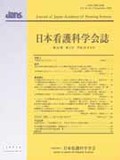Japanese
English
- 販売していません
- Abstract 文献概要
- 参考文献 Reference
要旨
目的:300床未満の医療機関や保健所における耐性菌感染管理の実態から,地域で耐性菌感染拡大予防に取り組むために看護職が取り組むべき課題を明確にする.
方法:モデル地域の医療機関の感染管理担当看護師を対象とした耐性菌感染管理の実態や院内教育についてのグループインタビューと,感染症対策担当の保健師を対象とした保健所における耐性菌感染管理の関わりについての面接調査を実施した.収集されたデータは,「耐性菌を拡げない」「耐性菌を産みださない」「地域における耐性菌感染管理システム」の視点から質的に分析した.
結果:感染管理担当看護師のグループインタビューから,看護師によって耐性菌や抗菌薬に対する知識や関心の差が大きく,標準予防策や個人防護具の使用に対する理解不足や感染予防よりも経費抑制が優先されているために個人防護具の使用が不確実であること,他施設との耐性菌情報の共有が乏しいことが明らかとなった.また,保健師の面接調査から,医療機関からの感染管理の問い合わせに保健師は直接関わっていないことや保健師に対する感染管理実践に関する教育の機会が少ないことが示された.
結論:本研究の結果から,看護職に対する感染管理教育の充実が必要であることが明らかとなった.地域で耐性菌感染拡大予防に取り組むためには,行政の保健師と感染管理についての高い実践力を持つ認定看護師等が連携しながら,医療施設の枠を越えて地域の看護職に対する感染管理教育や相談などに取り組む体制づくりが求められる.
Abstract
Purpose: To clarify the issues to be addressed by nurses in charge of infection control for preventing the spread of drug-resistant bacteria in regional medical facilities, a survey was conducted to elucidate the current conditions of infection control in hospitals and clinics with less than 300 beds, as well as in public health centers.
Methods: Group interviews were conducted with eight nurses in charge of infection control to clarify the actual situation of drug-resistant bacteria infection management and in-hospital education. Face-to-face interviews were also conducted with six public health nurses to ascertain the current conditions of drug-resistant bacteria infection management in public health centers. The collected responses were qualitatively analyzed from the viewpoints of "prevention of resistant bacteria production", "prevention of resistant bacteria proliferation" and "administration system for drugresistant bacteria infection control".
Results: Through analysis of the data from group interviews with nurses in charge of infection control, considerable differences were noted in their knowledge about and concerns regarding drug-resistant bacteria and antimicrobial agents. For example, the use of personal protective equipment was inconsistent because expense restraints were given priority over the infection prevention, and familiarity with standard precautions and protective equipment was lacking. Also, sharing of information about drug-resistant bacteria with other institutions had not been realized. In addition, through analysis of data from face-to-face interviews with public health nurses, it became clear that they were not directly involved in inquiries concerning infection control from medical institutions, and there were few opportunities for education about infection control practices for public health nurses.
Conclusions: Taken together, our findings made it clear that improvement of infection control education for nurses was necessary. For regional prevention of drug-resistant bacteria proliferation, highly skilled infection control nurses must cooperate with public health nurses in public administration, and the construction of a collaboration system for infection control education and consultations across facilities is urgently needed.
Copyright © 2013, Japan Academy of Nursing Science. All rights reserved.


